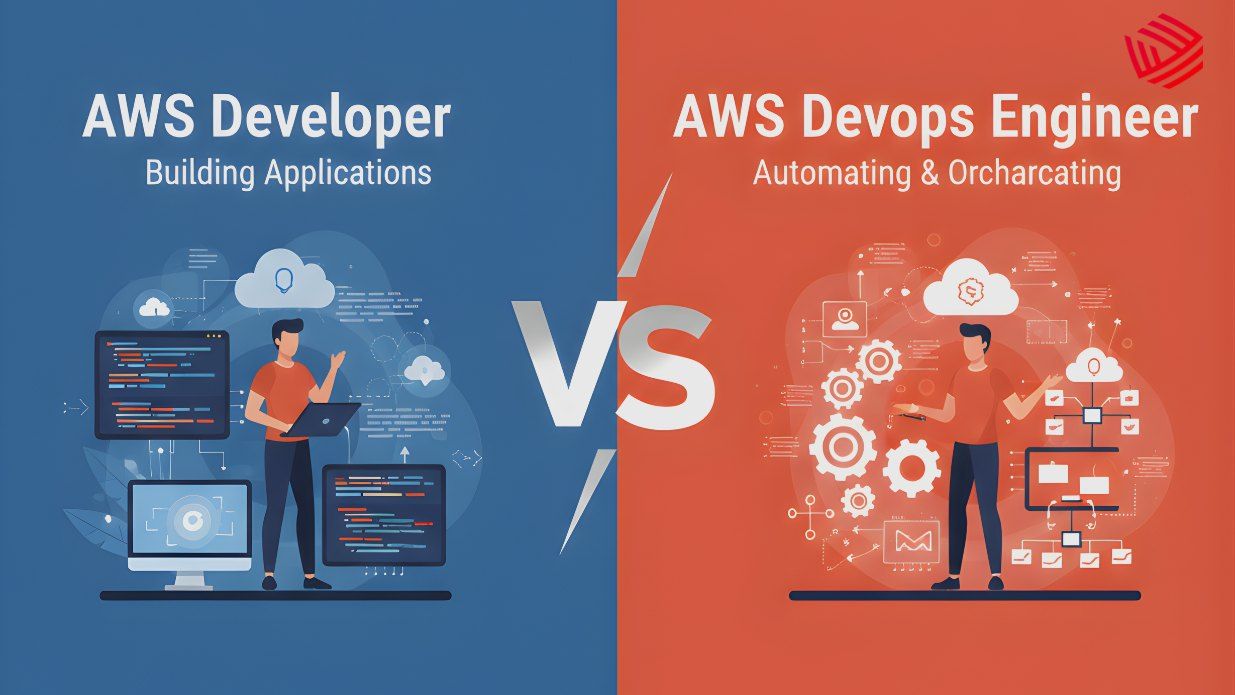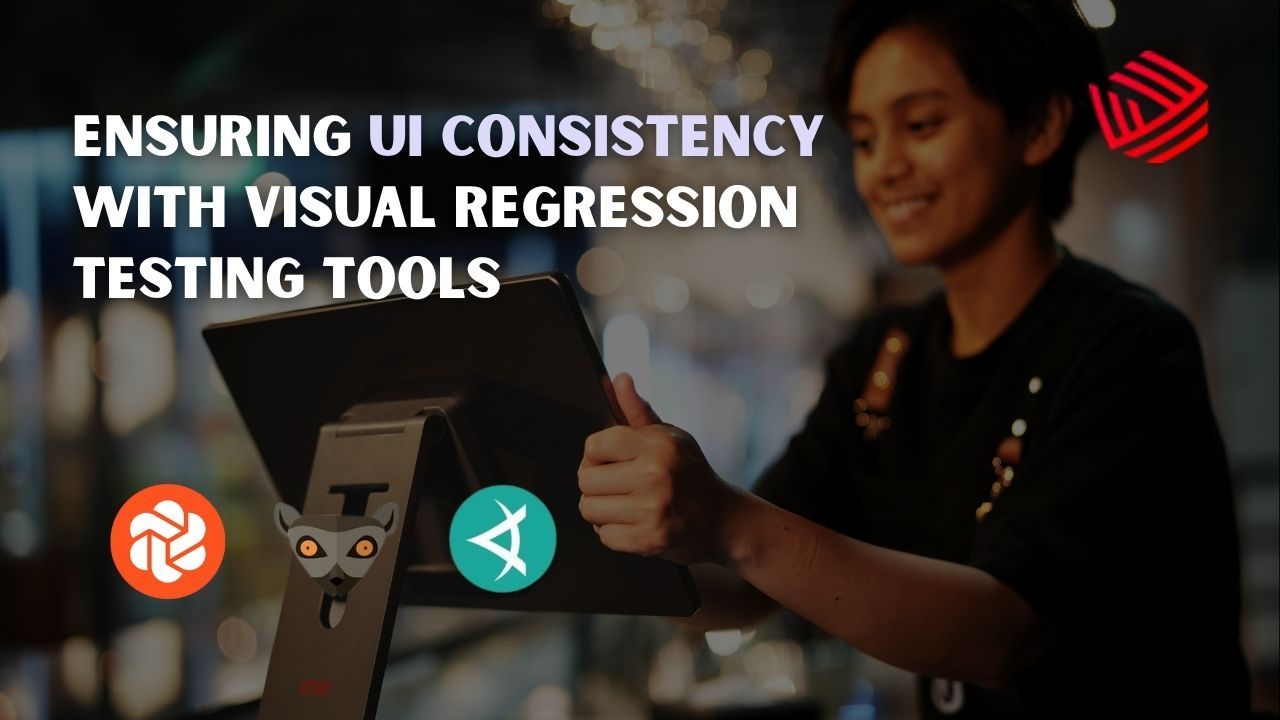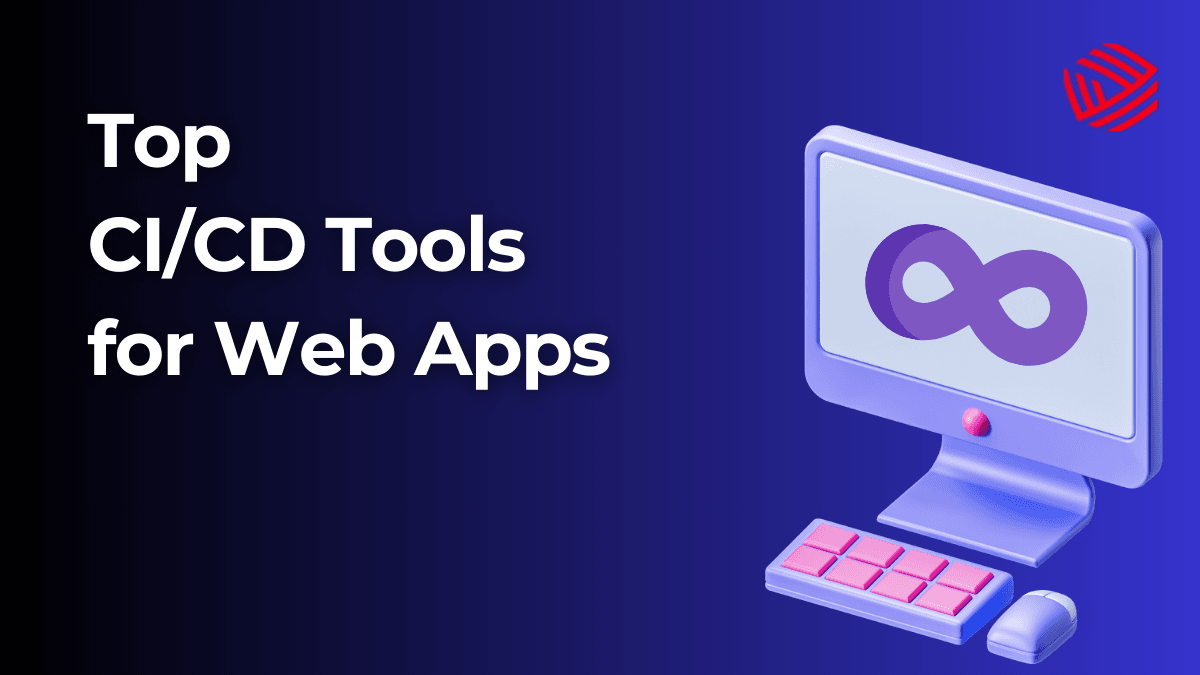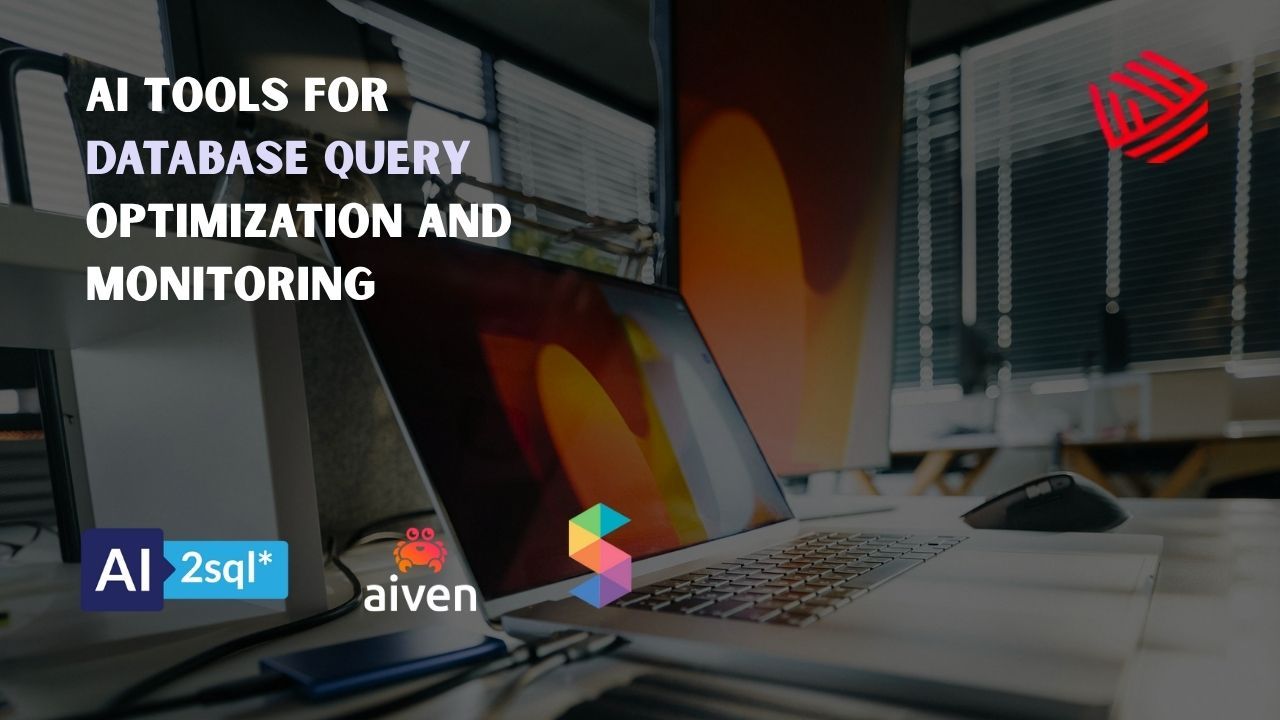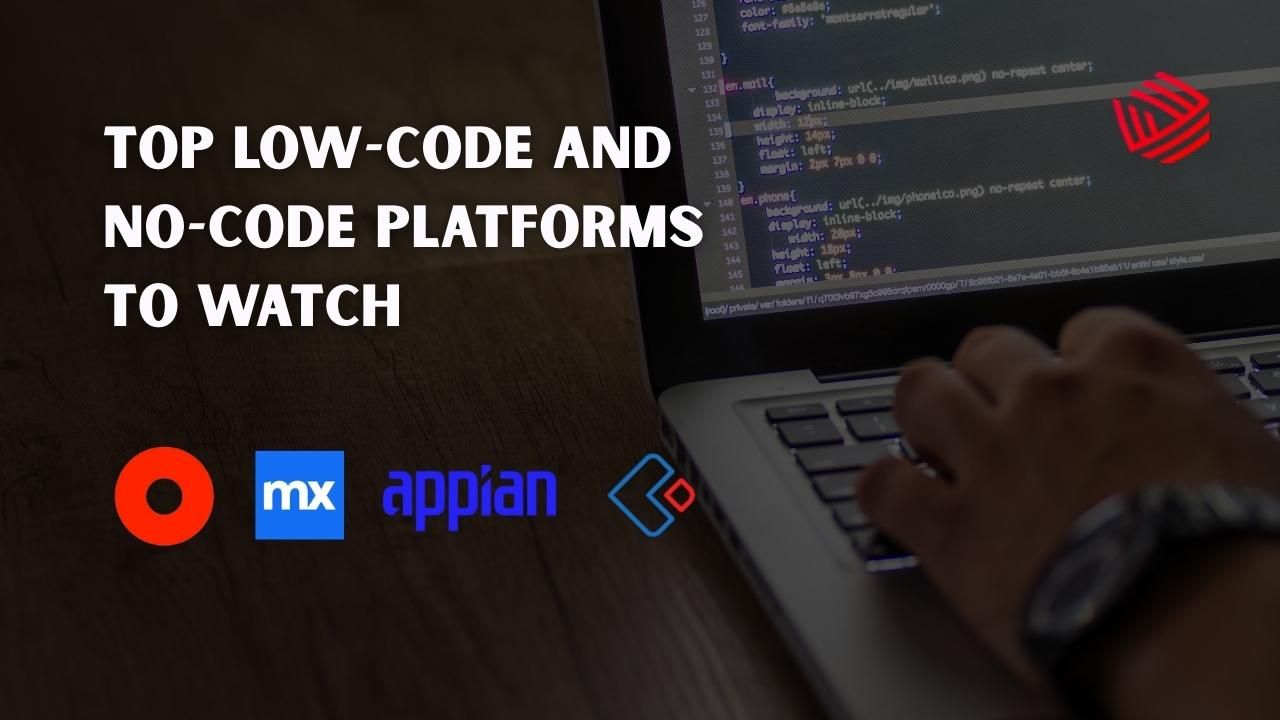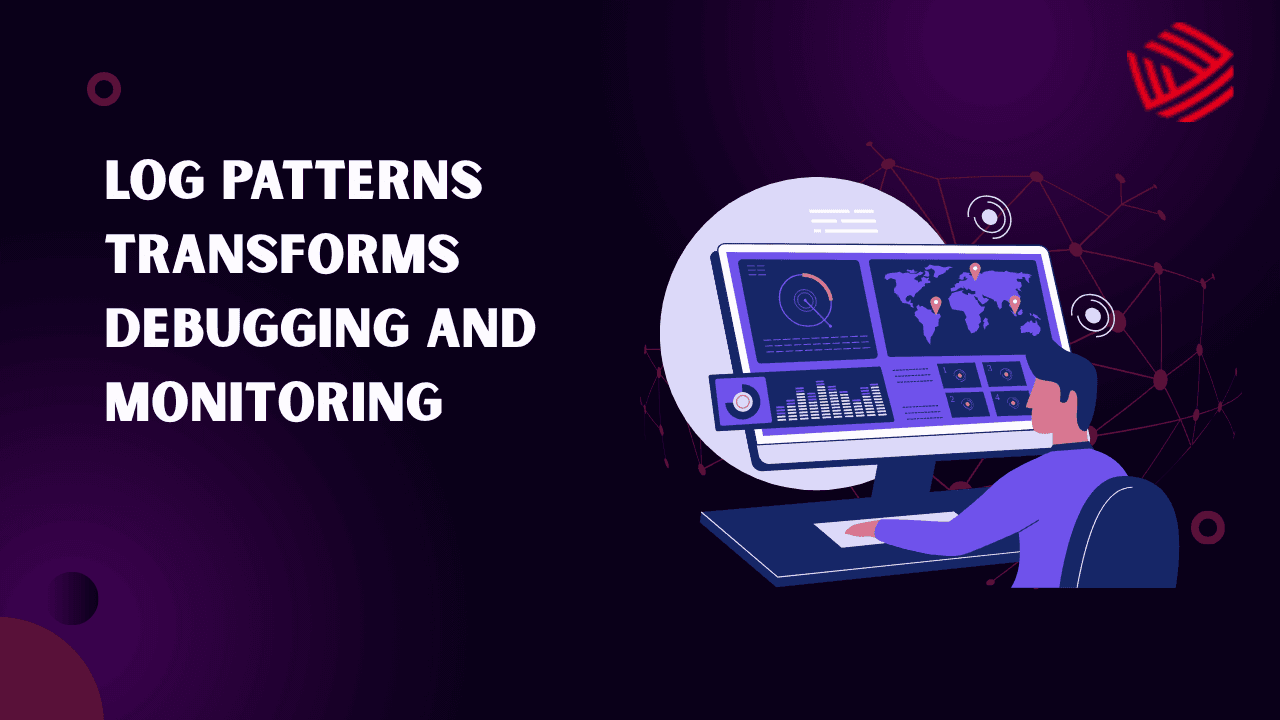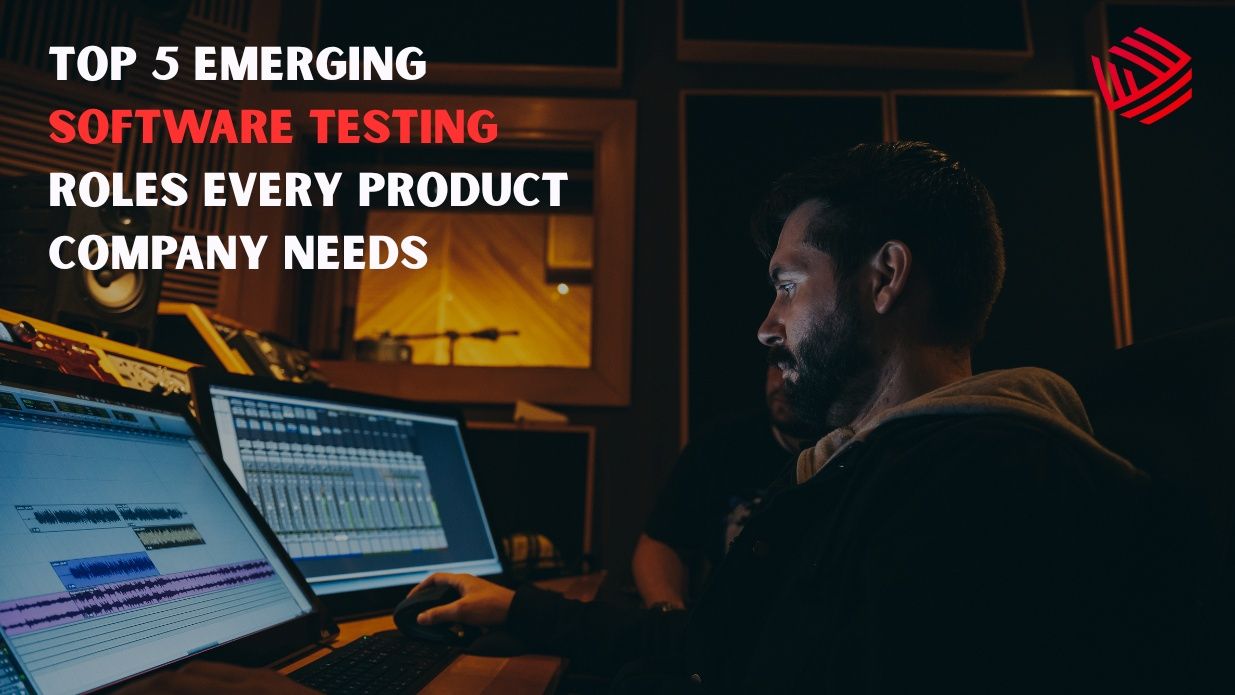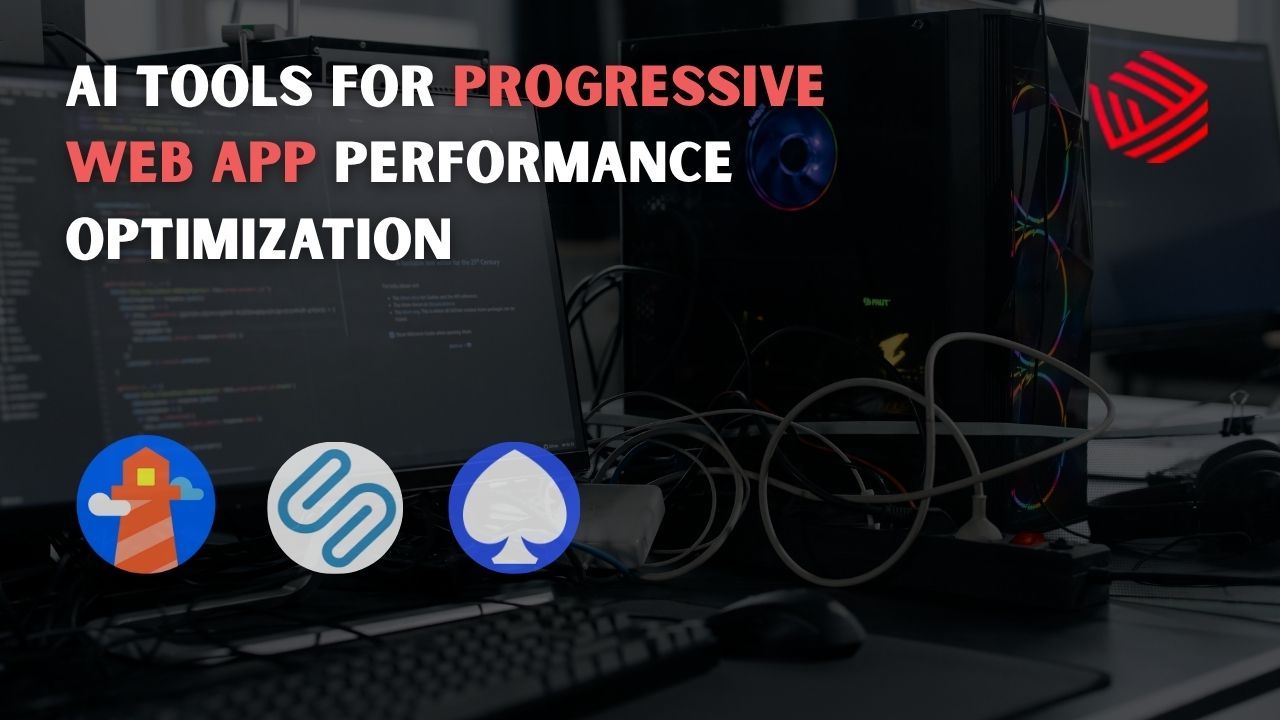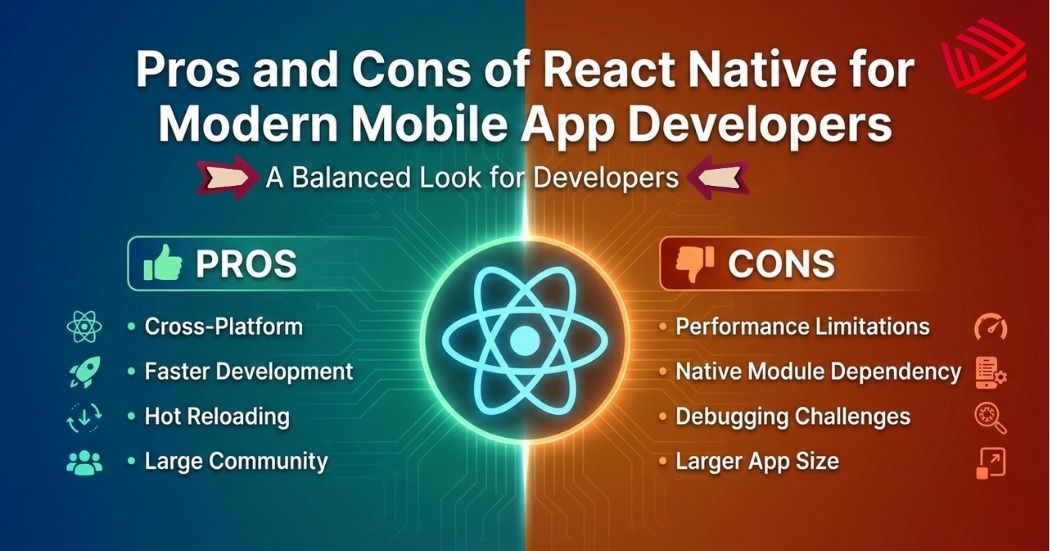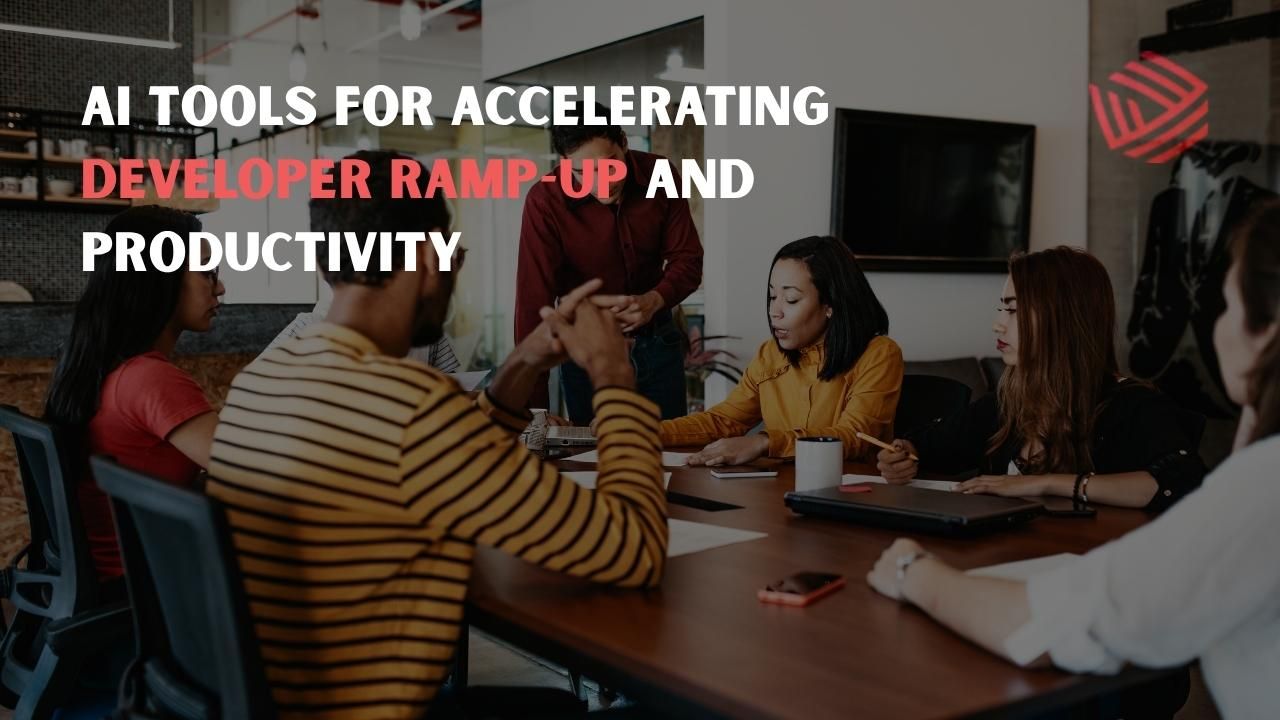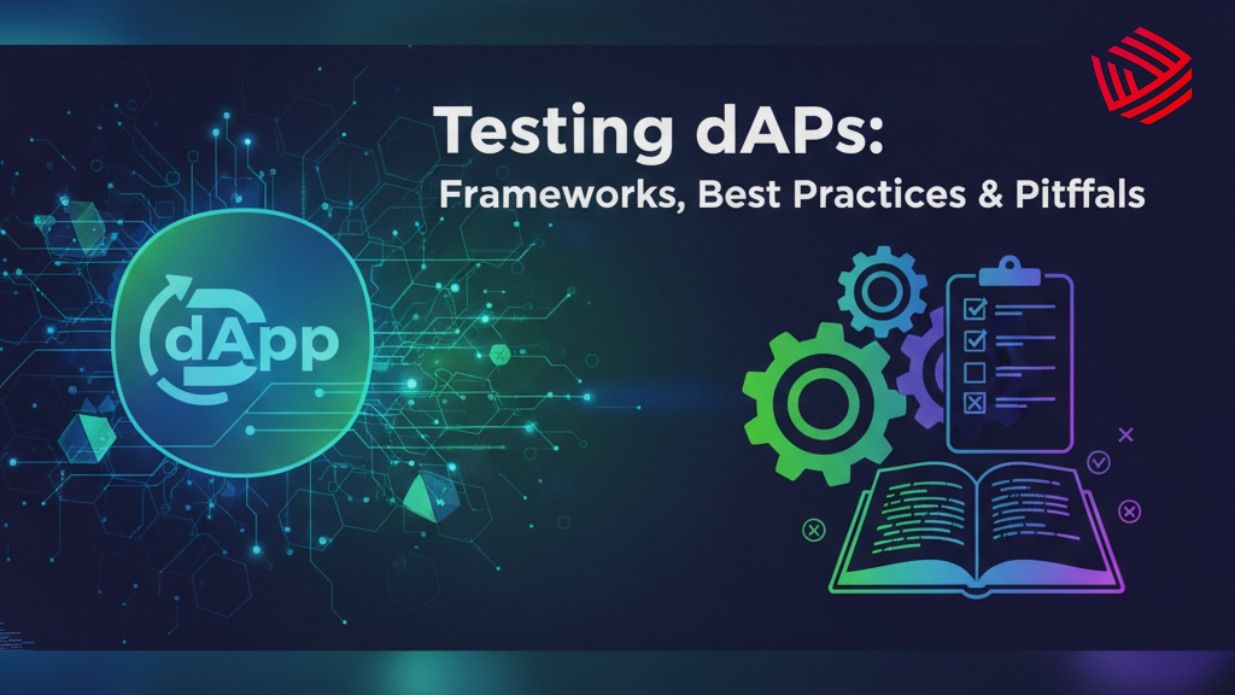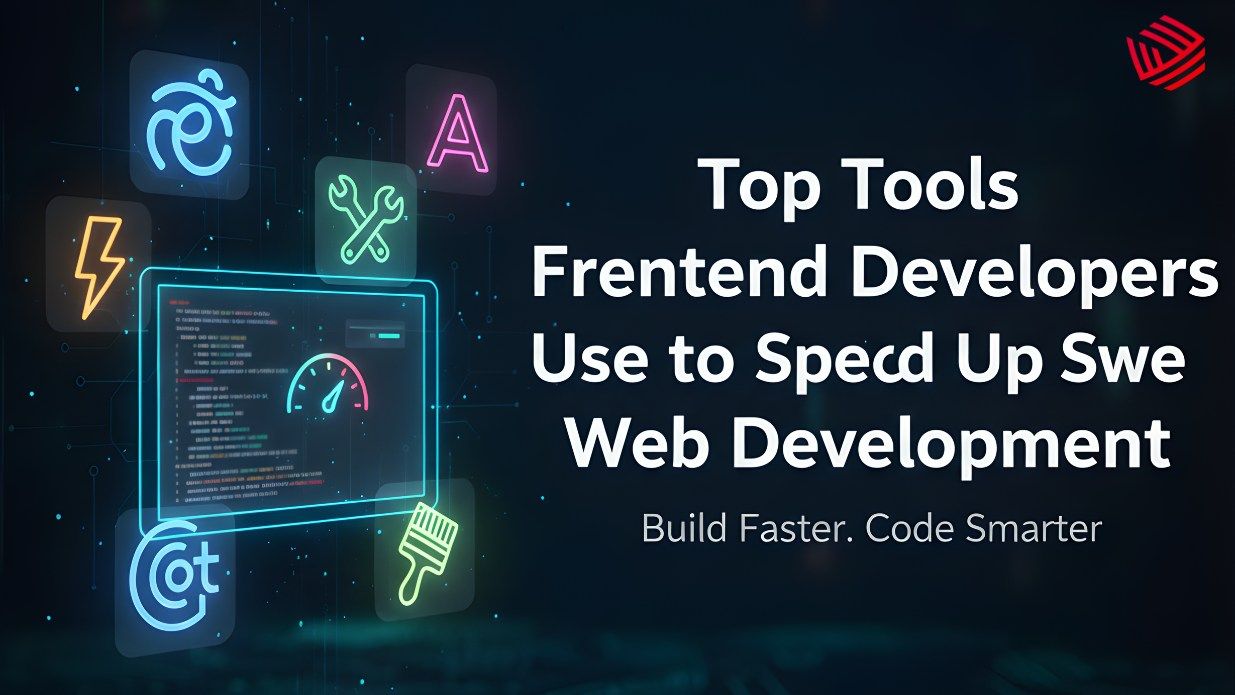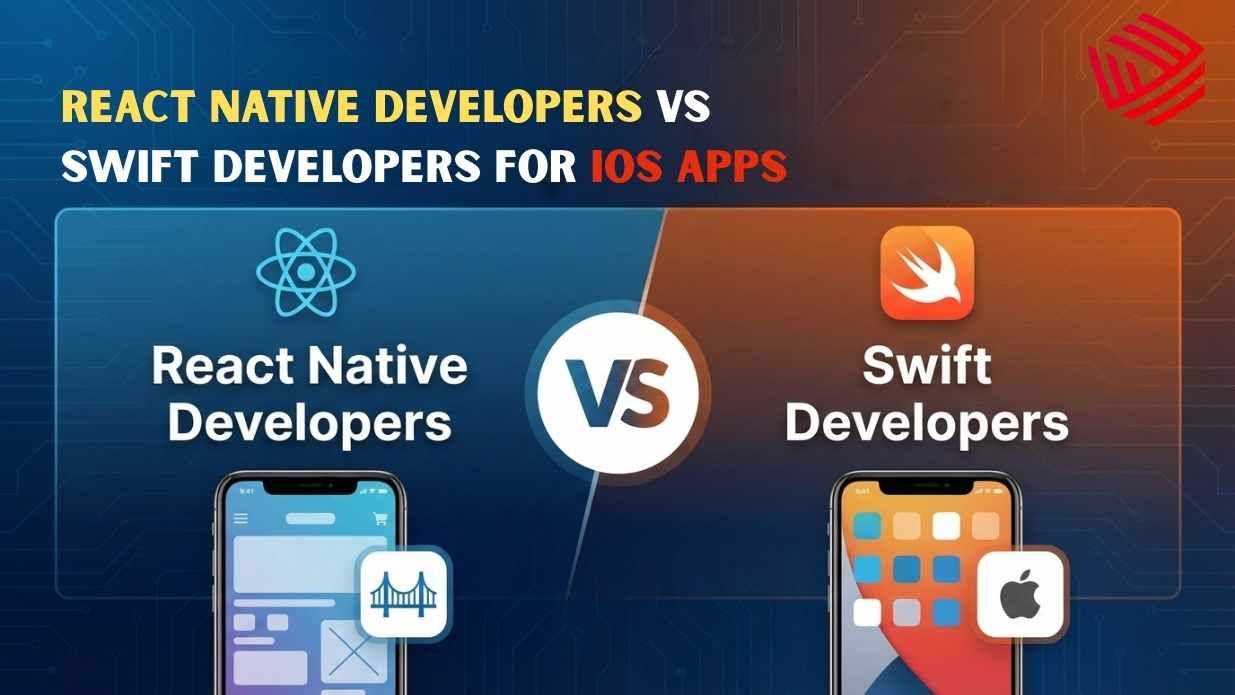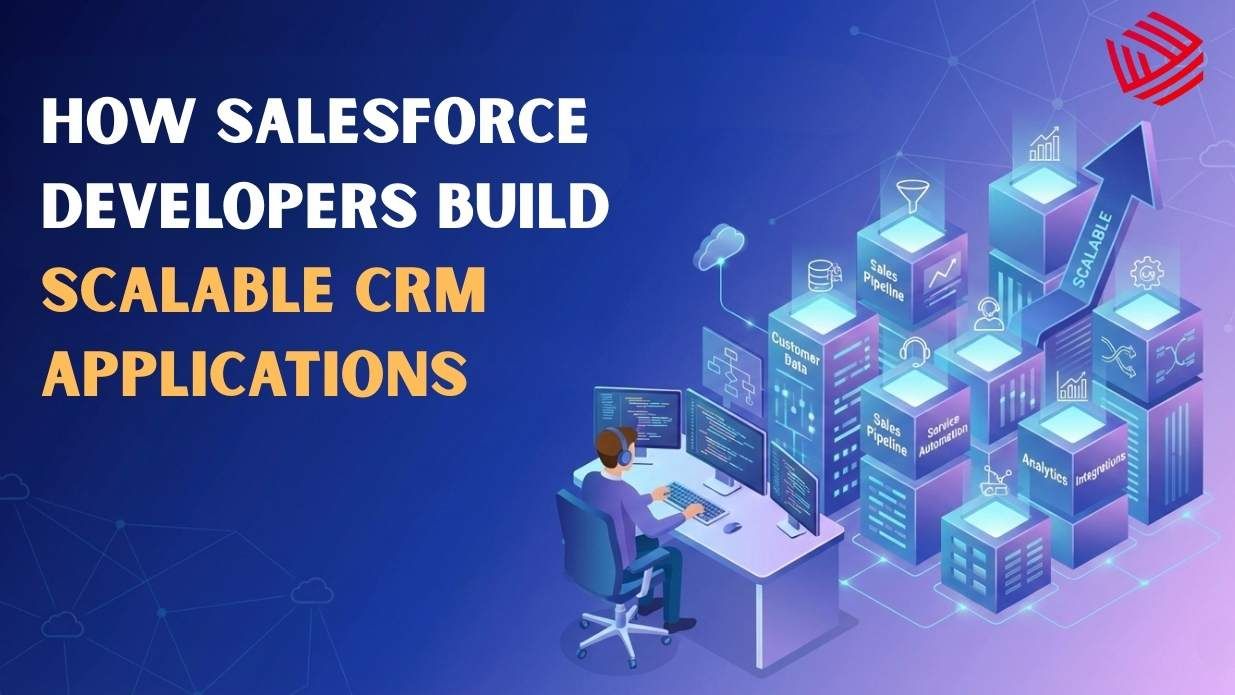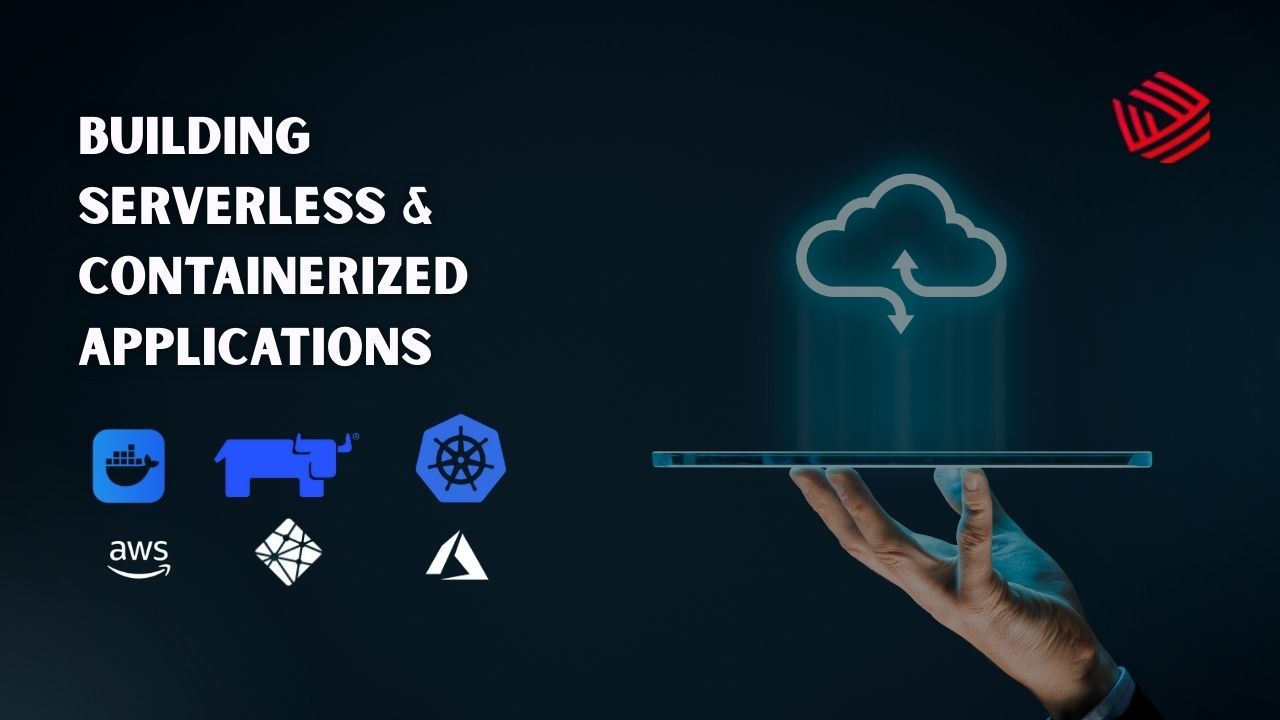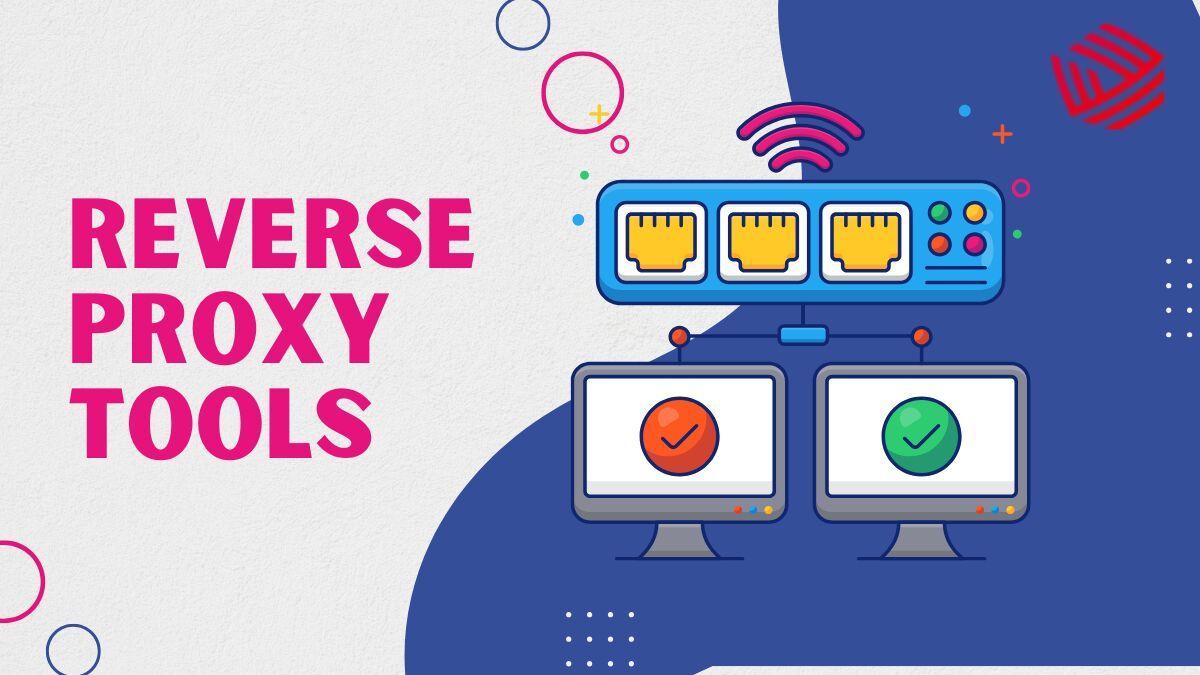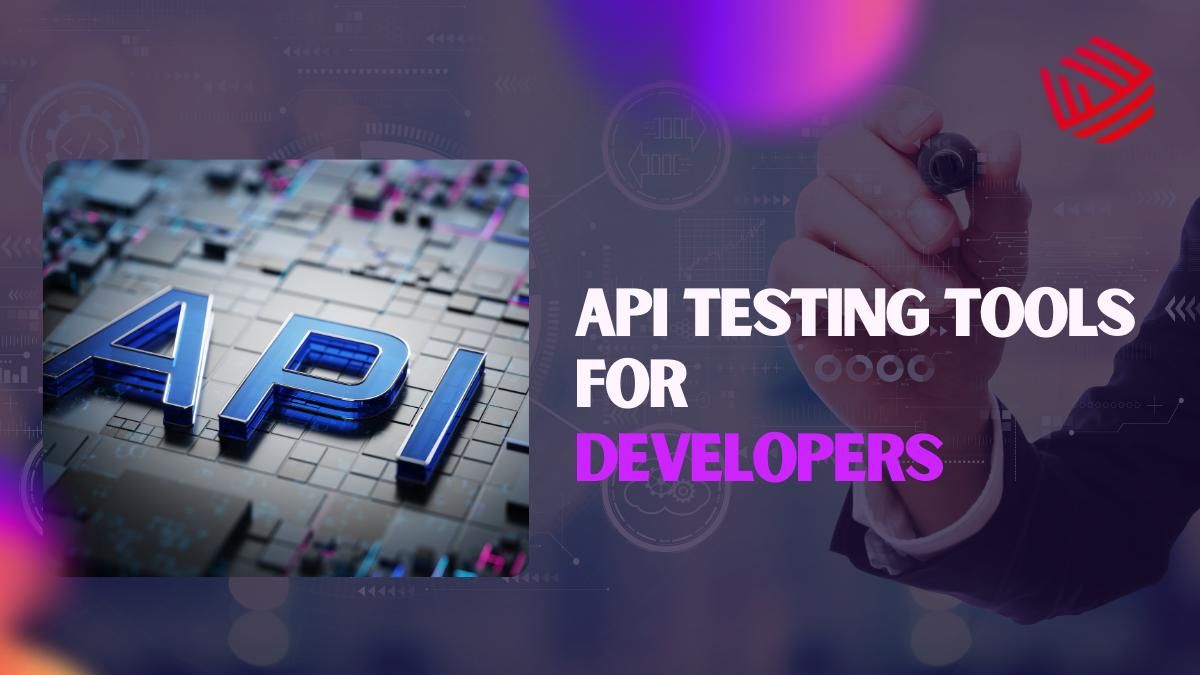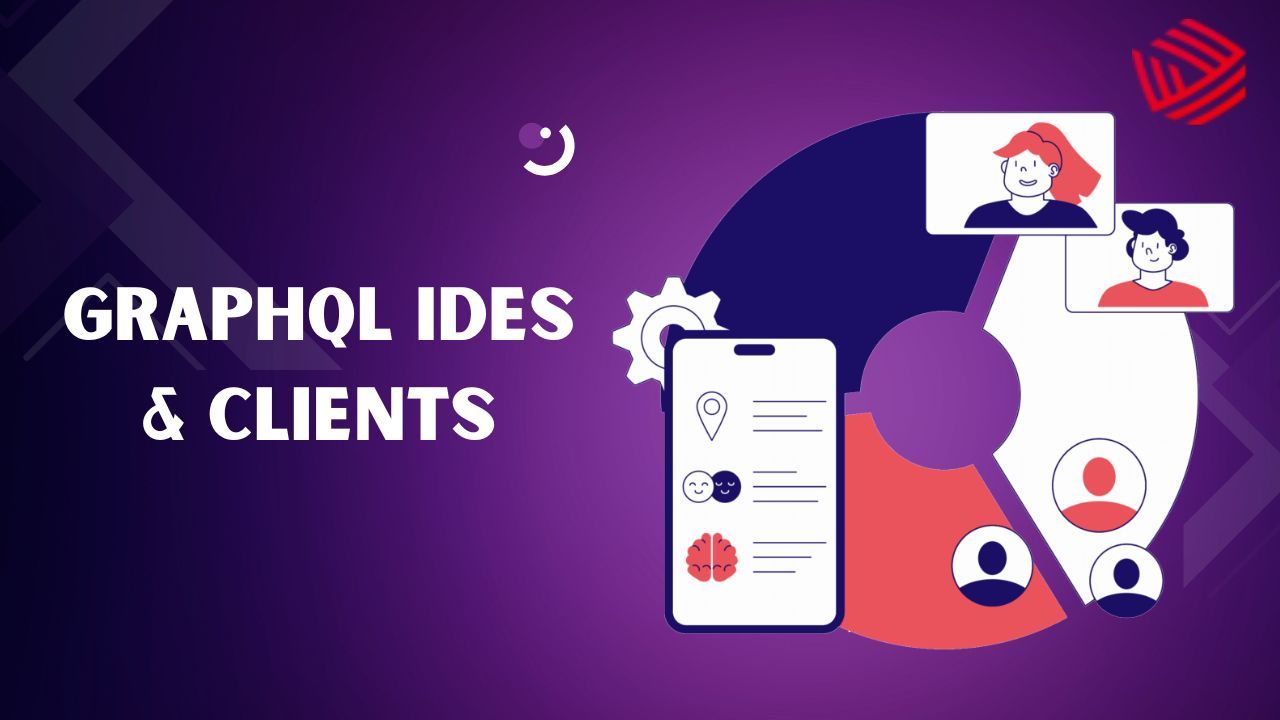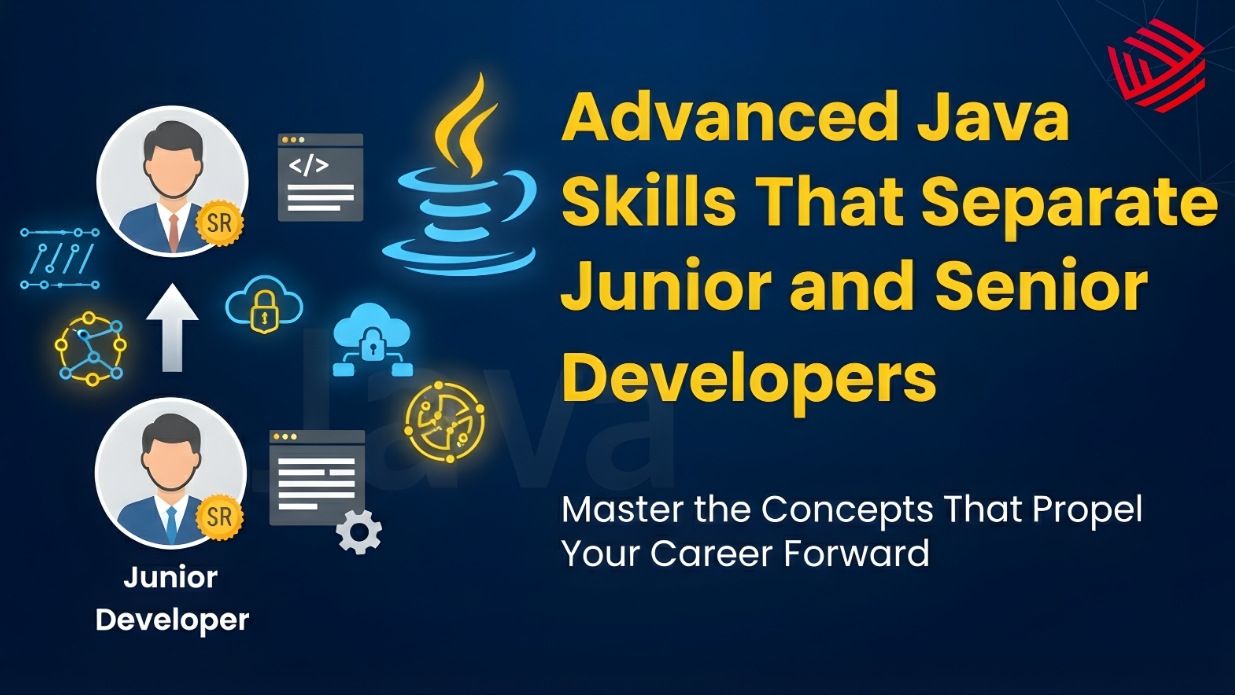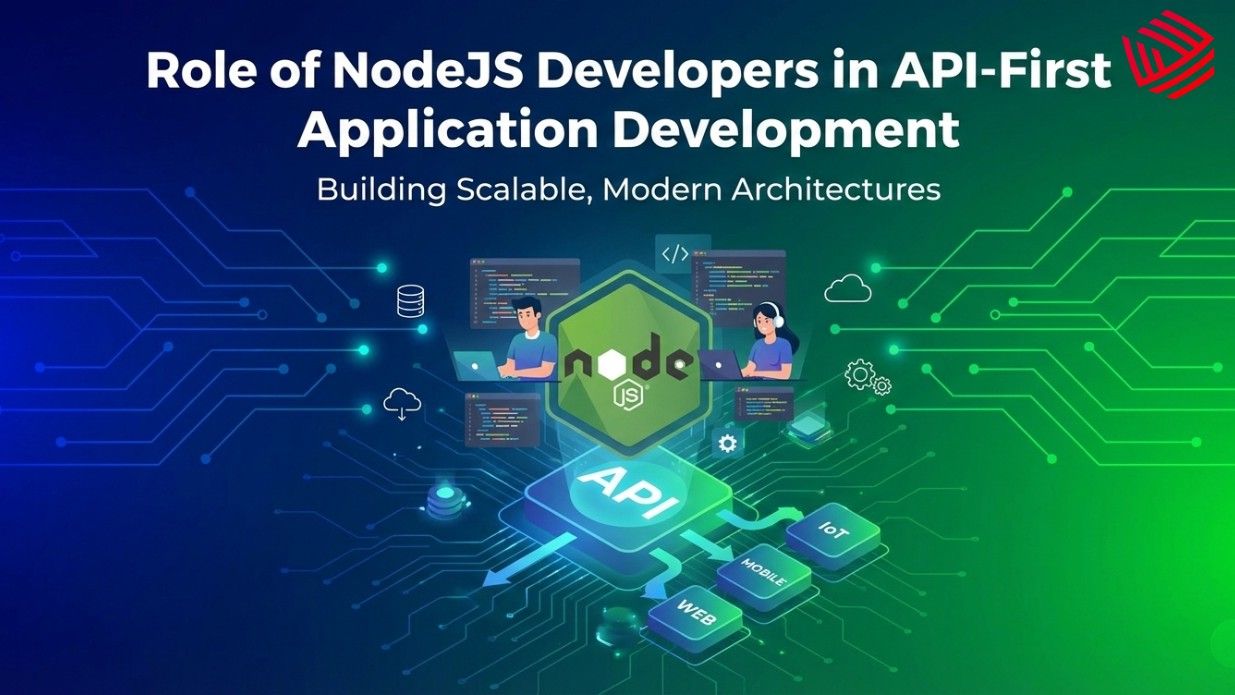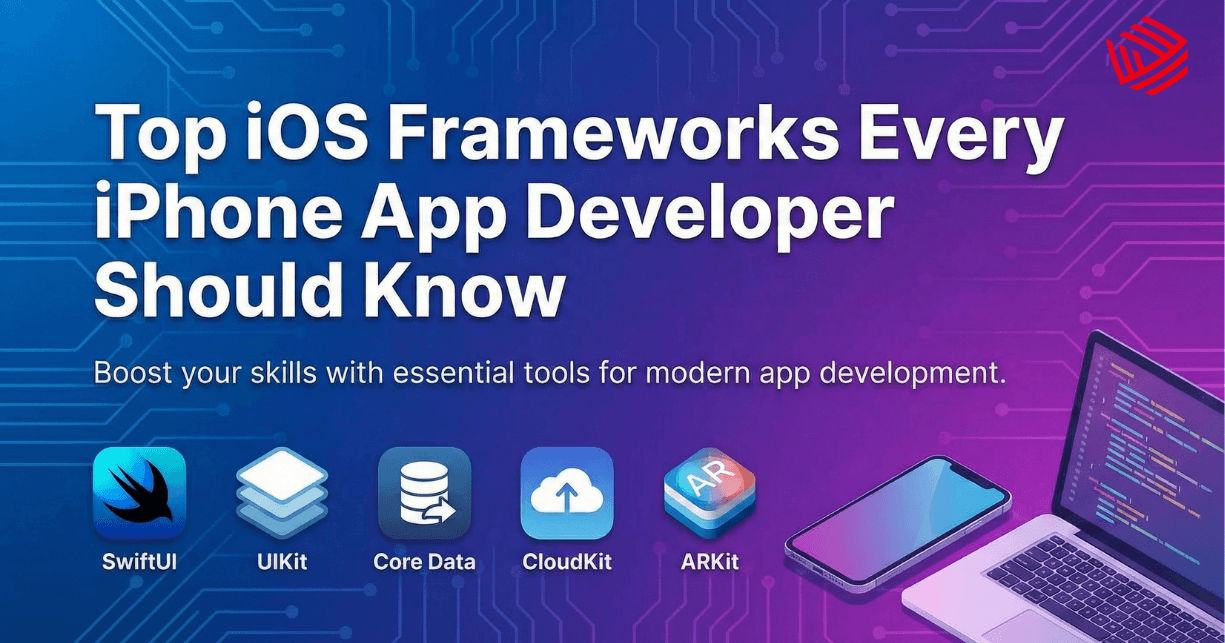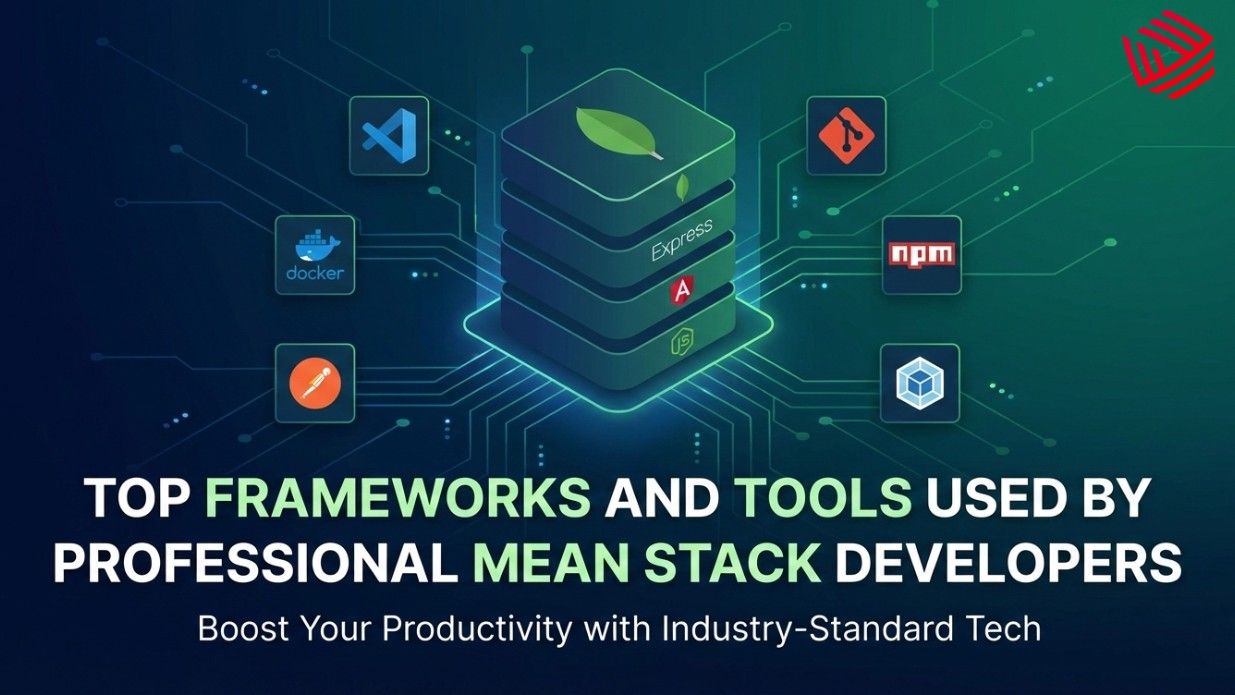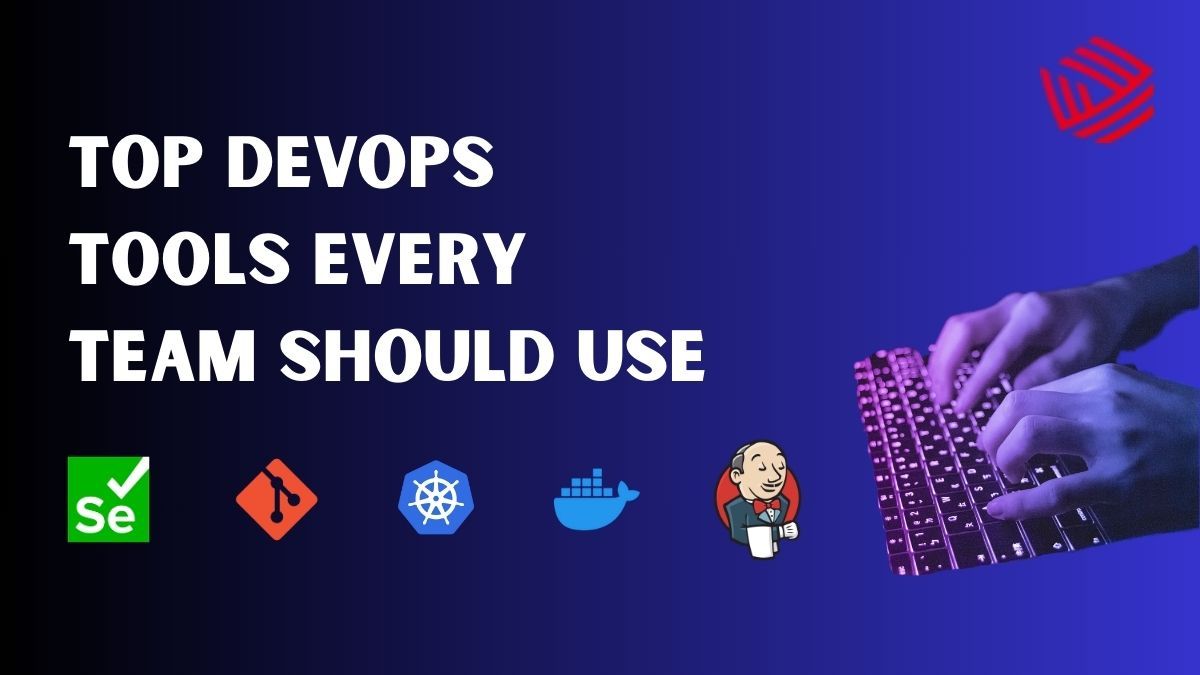Cloud-first companies today rely heavily on Amazon Web Services (AWS) to build scalable applications, automate deployments, and maintain resilient cloud infrastructure. As organizations shift from traditional software models to modern cloud-native ecosystems, two roles have emerged as the most in-demand across global tech teams: AWS Developers and AWS DevOps Engineers.
Although both roles work within the AWS environment, their responsibilities, goals, and career paths differ significantly. Businesses often struggle to understand whether they need a developer who builds applications or an operations engineer who manages cloud automation. Similarly, professionals exploring cloud careers often search for clarity about which role suits their skills, interests, and long-term goals.
Introduction: Why the AWS Developer vs DevOps Engineer Debate Matters in 2025
As AWS adoption rises across enterprises, roles within cloud teams continue to evolve. Many job seekers search for guidance on whether to pursue AWS Developer jobs, AWS DevOps engineer jobs in India, or even AWS cloud developer jobs in United States for better global exposure. Meanwhile, companies expanding their engineering teams must understand how developers and DevOps engineers contribute differently to cloud success.
The demand for cloud automation, CI/CD pipelines, Infrastructure as Code (IaC), and secure application deployments has created clear distinctions in responsibilities. Developers focus on creating cloud applications, while DevOps engineers ensure these applications run efficiently, securely, and reliably at scale.
Understanding the difference helps companies recruit correctly and helps professionals follow the right learning path, whether they plan to become an AWS Certified Developer Associate or pursue AWS Certified DevOps Engineer Professional certification.
The Core Difference Between AWS Developers and AWS DevOps Engineers
Although both roles operate in the same cloud ecosystem, their goals differ:
- AWS Developers focus on coding, building, and integrating applications with AWS services.
- AWS DevOps Engineers automate, monitor, and manage the cloud infrastructure that runs those applications.
To make this clearer, consider the sentence:
When comparing a developer vs operations engineer, it becomes clear that AWS Developers concentrate on writing and optimizing code, whereas AWS DevOps Engineers ensure system reliability, CI/CD integration, and cloud automation using modern DevOps Tools.
This is the foundation of understanding both roles.
What Does an AWS Developer Do?
AWS Developers design, develop, and manage cloud-based applications leveraging AWS services. Their primary responsibilities include:
- Writing application logic
- Integrating APIs
- Working with cloud-native services
- Debugging and testing applications
- Ensuring performance and scalability
A correct explanatory line including a required keyword:
The AWS developer role responsibilities include building microservices, integrating with AWS Lambda, managing cloud storage, and ensuring smooth application execution across distributed environments, sometimes using GitHub Alternatives for source control and collaboration.
AWS Developers often work closely with backend teams, solution architects, QA testers, and DevOps engineers to deliver high-quality cloud applications.
What Does an AWS DevOps Engineer Do?
A DevOps engineer combines development knowledge with operational expertise. They create efficient workflows that automate the entire delivery pipeline.
Here is a correct key-sentence containing required keywords:
When evaluating what an AWS DevOps Engineer does vs AWS Developer, the biggest difference is that the DevOps engineer focuses on system reliability, CI/CD workflows, cloud infrastructure, and deployment pipelines, while the developer focuses on building application functionality.
An AWS DevOps Engineer works on:
- Continuous Integration and Continuous Delivery
- Monitoring performance
- Infrastructure as Code
- Automation of cloud operations
- Deployment security
Another meaningful keyword sentence:
Many companies emphasize AWS automation engineering and DevSecOps Tools to improve deployment consistency, reduce errors, and enable better release cycles across multiple environments.
Skills Needed for AWS Developer vs DevOps Engineer
| Skill Area | AWS Developer | AWS DevOps Engineer |
| Coding | Strong (Python, Node.js, Java) | Moderate |
| AWS Services | API Gateway, Lambda, DynamoDB | CloudFormation, ECS, EKS |
| CI/CD Tools | Optional | Mandatory |
| Automation | Limited | Extensive |
| IaC | Basic | Advanced |
| Monitoring | Light | Heavy |
| Security | App-level | Infrastructure-level |
| Deployment | Assisted | Automated & Managed |
Let’s integrate a required keyword naturally:
Teams often compare the skills needed for AWS Developer vs DevOps Engineer because both roles require cloud knowledge, but DevOps focuses more on automation and infrastructure, while developers focus heavily on coding and application logic.
Important AWS Tools and Technologies Used by Both Roles
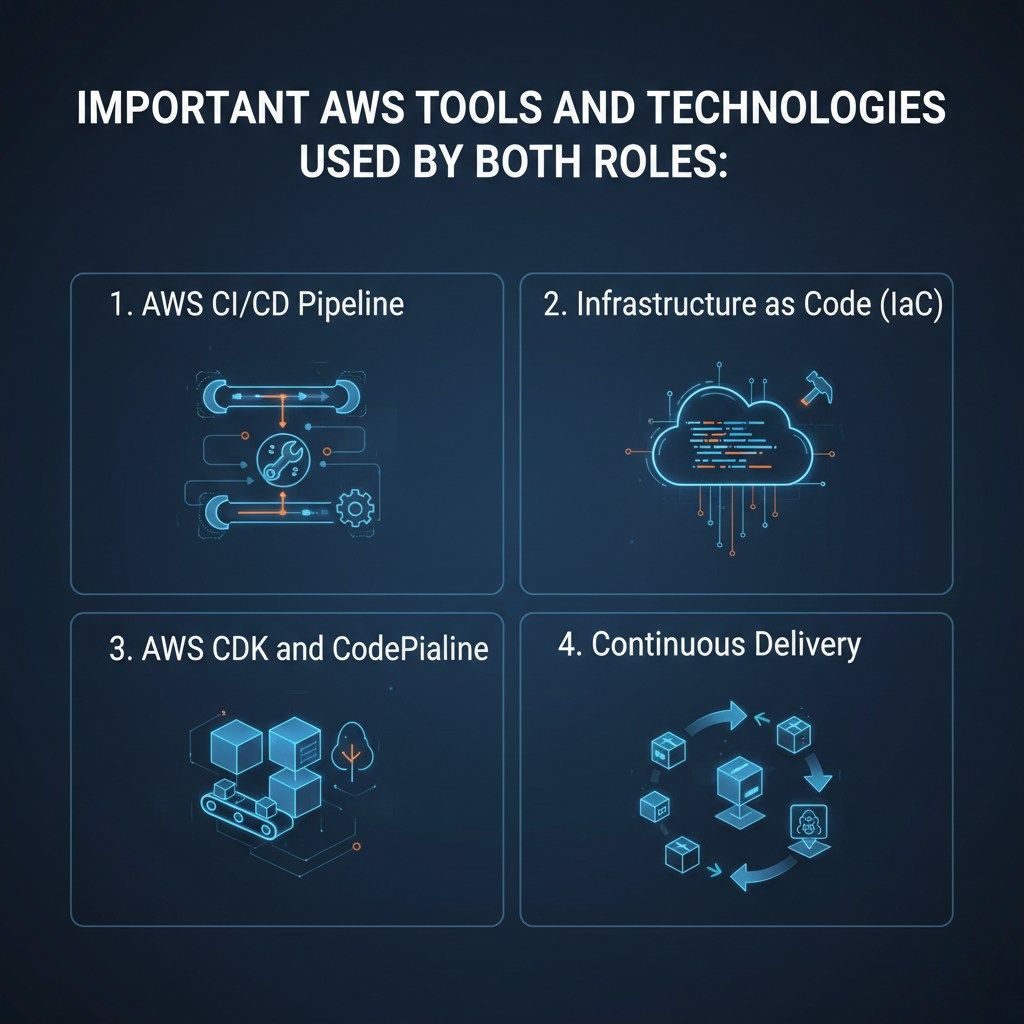
1. AWS CI/CD Pipeline
Both roles interact with CI/CD workflows to some degree. Developers trigger builds, while DevOps engineers design and maintain the entire pipeline.
A readable keyword sentence:
Managing an AWS CI/CD pipeline is typically part of the DevOps engineer’s daily tasks, although skilled developers also understand pipeline triggers and build status reports.
2. Infrastructure as Code (IaC)
DevOps engineers use CloudFormation, Terraform, and CDK to define infrastructure.
A correct keyword sentence:
Modern teams increasingly rely on infrastructure as code AWS tools like CloudFormation, Terraform, and AWS IaC using CDK to ensure infrastructure consistency across multiple environments.
3. AWS CDK and CodePipeline
DevOps engineers frequently use advanced IaC automation.
Sentence with both keywords:
Tools such as AWS CDK (Cloud Development Kit) and AWS CodePipeline help DevOps professionals automate deployment steps, manage cloud resources programmatically, and maintain version-controlled infrastructure.
4. Continuous Delivery
This is DevOps’ core area.
Sentence:
Many organizations invest in continuous delivery AWS solutions to accelerate application releases and maintain stable deployment workflows.
AWS Automation and DevOps Culture
DevOps engineers focus on building automated pipelines, reducing manual tasks, and minimizing deployment risks. They also drive collaboration and operational stability.
Sentence:
A strong AWS DevOps culture enables teams to embrace automation, monitoring, and rapid iteration across development and deployment cycles.
Another:
Organizations aiming for better scalability often invest heavily in AWS automation to reduce downtime, optimize performance, and streamline production workflows.
Certifications: Developer vs DevOps Professional
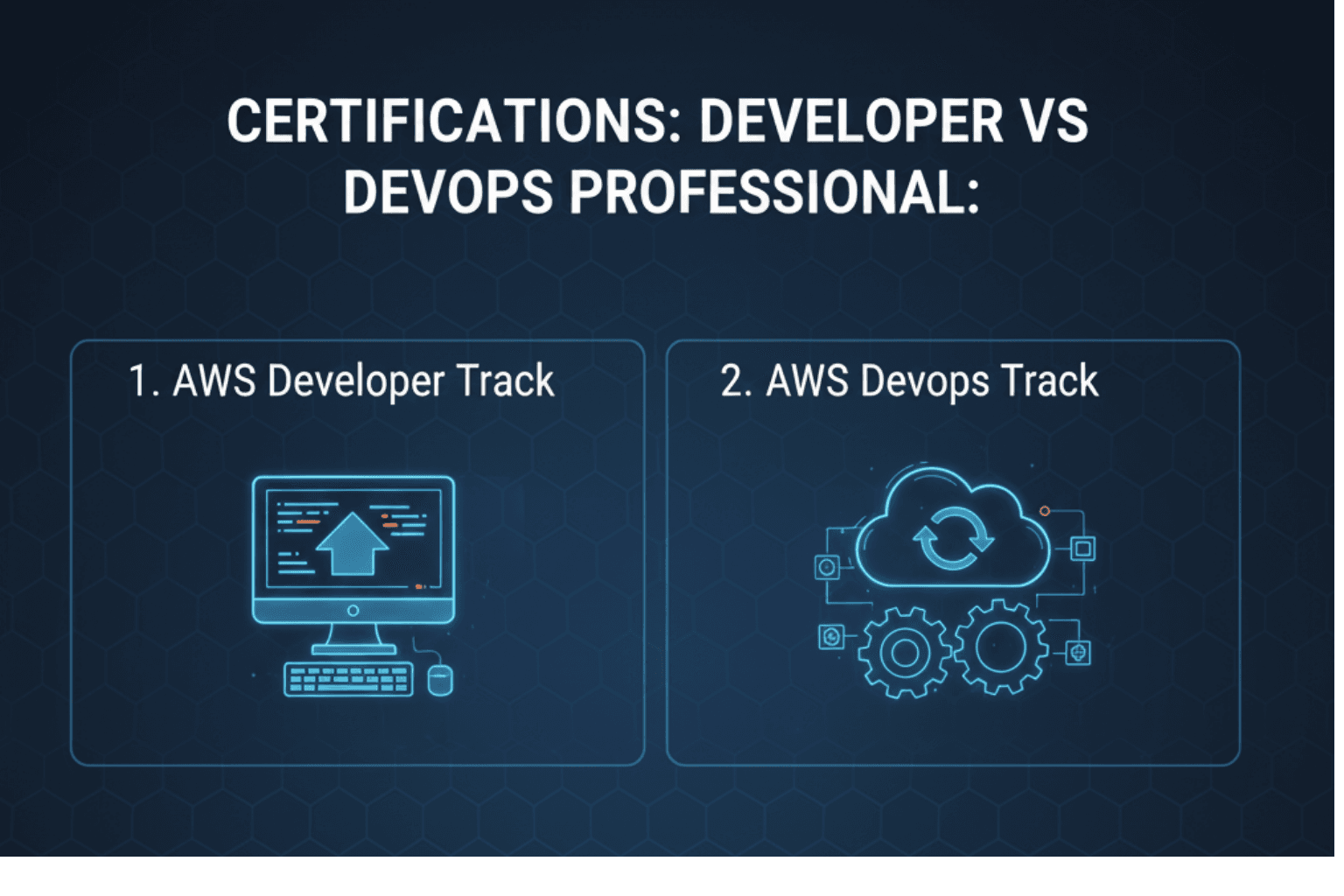
AWS certifications play an important role in determining career direction.
1. AWS Developer Track
The main certification is the AWS Developer Associate credential.
Sentence:
Many beginners choose the AWS Certified Developer Associate certification because it validates coding, API integration, and hands-on AWS application development skills.
2. AWS DevOps Track
The key credential is the AWS Certified DevOps Engineer Professional exam.
Sentence:
The DevOps Professional AWS certification, formally known as the AWS Certified DevOps Engineer Professional, is intended for engineers who manage automation, CI/CD, and cloud reliability.
Comparison of Certifications
A required keyword sentence:
Many learners often search for the difference between AWS Developer Associate and DevOps Professional certification to decide which credential better aligns with their long-term cloud career goals.
Which AWS Certification Is Better?
This depends entirely on your career goals.
Sentence using required keyword:
Students frequently ask which AWS certification is better: Developer or DevOps Professional, and the answer depends on whether they want to build cloud applications or manage deployment pipelines and cloud infrastructure.
How to Become a DevOps Engineer vs Developer
Another required keyword sentence:
Those wondering how to become an AWS certified DevOps engineer vs developer should know that the developer path focuses on programming and cloud APIs, while the DevOps path demands expertise in automation, CI/CD, and Infrastructure as Code.
AWS Developer → Ideal for programmers
AWS DevOps Engineer → Ideal for automation-oriented engineers
Career Path: AWS Developer vs DevOps Engineer in 2025
Sentence using required keyword:
In the AWS Developer vs AWS DevOps career path 2025 comparison, DevOps engineers tend to earn higher salaries due to broader responsibilities in automation, infrastructure management, and cloud reliability.
Developers may transition to DevOps later, but DevOps roles require deeper operational and automation expertise.
Salary Comparison and Job Demand
Sentence including required keyword:
Many career portals highlight AWS DevOps engineer job responsibilities and salary, showing that DevOps engineers generally earn more because they manage mission-critical deployment and automation systems.
Global Opportunity
- High demand in the US for senior cloud developers
- Strong demand in India for DevOps engineers
- Remote-first adoption favors cloud expertise
Sentence with keyword:
Growing enterprise adoption has increased the demand for AWS DevOps engineer jobs in India, as companies seek automation specialists who can manage AWS-based infrastructures.
Sentence with US keyword:
Companies offering AWS cloud developer jobs in United States often look for strong Kotlin, Python, and serverless experience with focus on scalable cloud application development.
Training and Certification Centers in India
Sentence with given keywords:
Many learners seek AWS developer certification training in Noida / Gurgaon / Bangalore to build strong AWS fundamentals, while DevOps aspirants prefer the AWS DevOps course in Greater Noida / Delhi NCR for hands-on automation and pipeline training.
Another keyword sentence:
Several authorized institutes function as an AWS certification center in India, helping students prepare for developer and DevOps exams through instructor-led training and lab-based sessions.
Conclusion
Choosing between AWS Developer and AWS DevOps Engineer requires clarity about your strengths and interests. Developers build applications, while DevOps engineers manage automation, infrastructure, and delivery pipelines. Both roles offer high-paying career opportunities and long-term growth.
If your passion is coding, APIs, and microservices, choose the developer track. If you enjoy automation, pipelines, scalability, and cloud operations, choose the DevOps track.
Both paths are future-proof. Both paths are in high demand. And both contribute essential value to the cloud ecosystem.
FAQ: AWS Developer vs AWS DevOps Engineer
1. What is the main difference between an AWS Developer and an AWS DevOps Engineer?
An AWS Developer focuses on writing, testing, and deploying application code using AWS services like Lambda, API Gateway, and DynamoDB. An AWS DevOps Engineer, on the other hand, works on automating infrastructure, building CI/CD pipelines, managing deployments, and ensuring system reliability. Both roles use AWS, but their responsibilities and workflows are different.
2. Which role is better for beginners: AWS Developer or AWS DevOps Engineer?
If you enjoy coding and application-building, starting as an AWS Developer is easier. If you prefer automation, cloud infrastructure, and handling deployments, then AWS DevOps Engineer may be a better fit. Many professionals begin as developers and later transition into DevOps after gaining experience with AWS tools and automation.
3. Do AWS Developers also work with CI/CD pipelines like DevOps Engineers?
Yes, AWS Developers often interact with CI/CD pipelines, but typically at the application level—such as writing build scripts or preparing code for deployment. AWS DevOps Engineers, however, design, automate, and manage the full CI/CD workflow using services like AWS CodePipeline, CodeBuild, and CodeDeploy.
4. Which AWS certification should I choose: Developer Associate or DevOps Professional?
Choose AWS Developer Associate if your goal is to build applications, work with APIs, and write cloud-based code. Choose AWS DevOps Engineer Professional if you want to focus on automation, continuous delivery, monitoring, and cloud infrastructure. Both certifications build strong cloud careers but lead to different specializations.
5. Is there a salary difference between AWS Developers and AWS DevOps Engineers?
In most cases, AWS DevOps Engineers earn higher salaries because their responsibilities span automation, operations, security, and infrastructure management. However, skilled AWS Developers who work on large-scale, high-performance applications can also earn competitive packages. Salary depends on skill level, experience, and expertise with AWS tools.
6. Can an AWS Developer become an AWS DevOps Engineer later?
Absolutely. Many AWS Developers transition into DevOps roles because they already understand AWS services and application logic. By learning tools like Terraform, CloudFormation, Docker, Kubernetes, and CI/CD pipelines, a developer can successfully move into DevOps engineering and expand career opportunities.
7. Which role is more in demand in 2025: AWS Developer or AWS DevOps Engineer?
Both roles are highly in demand, but AWS DevOps Engineers have a stronger hiring trend due to the rise of automation, continuous delivery, and cloud-native operations. Companies need professionals who can deploy reliable systems at scale, making DevOps a rapidly growing field.
8. Do AWS DevOps Engineers write code like AWS Developers?
Yes, but not as extensively. DevOps Engineers write automation scripts, deployment tools, infrastructure code (IaC), and monitoring workflows. AWS Developers focus on application logic, APIs, backend services, and front-end integrations. DevOps coding is more about automation, while developer coding is about features and functionality.

